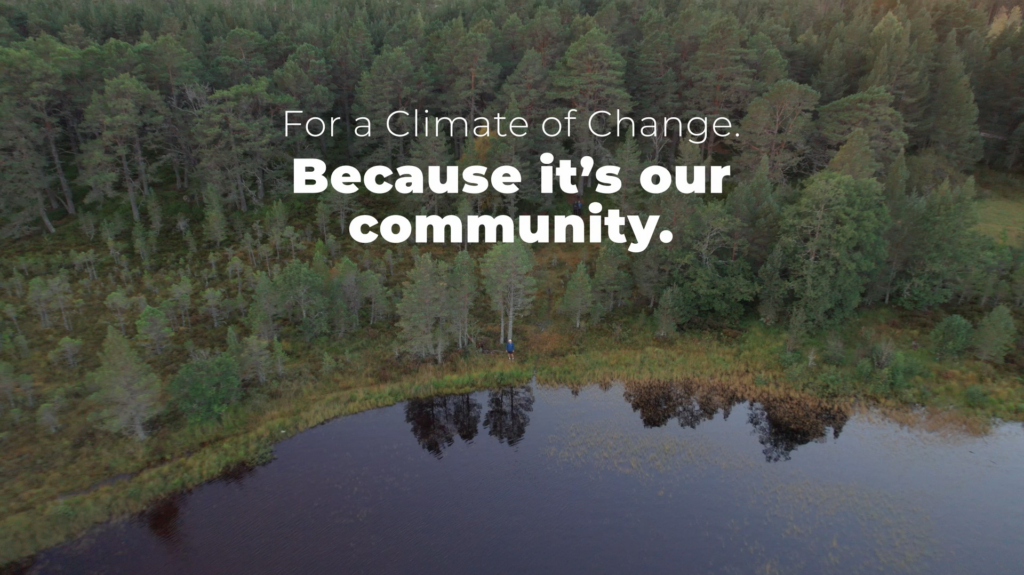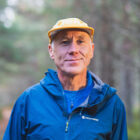Collectively we will make the difference that’s needed

How do you feel about the climate crisis we are facing? How do you experience changes yourself?
My connection with nature started as a teenager when I first discovered the mountains. I was so happy and lucky that that happened. And over the years, I’ve been very fortunate to climb mountains in different parts of the world, including here in Scotland, and now I see them mostly through running. Over the years I’ve experienced those changes, whether it’s seeing in spring budding happening earlier each year, and then summer becoming more unstable. And we’ve seen that throughout this summer with flooding events across Europe. Or sometimes in the higher mountains, looking at the glaciers, just in my lifetime I see astonishing glacial change. When I was a teenager, I might be climbing up a mountain and the glacier is almost reaching right down into the valley, and now they’ve retreated significantly. This demonstrates first hand to me over just a couple of decades, how climate change has affected the environment significantly. In Scotland, for example, we are seeing more flooding. Events that would once have been just once in a hundred years, we’re literally seeing two or three now in a decade. That’s a big worry for communities, particularly near floodplains.
How can foundations tackle the climate crisis?
Communities are the powerhouse of change. People tend to change behaviours by some personal experience, something that happens to them, or something they see, and they realise the effect it can have on their life, or perhaps a member of their family. The more people that we can gather to move in the right direction, the more likely we’re going to have a stronger voice to effect systems change, because eventually it’s systems change connected with those nudges to individuals and citizens that will make the biggest impact.
We are Scotland’s community foundation and we’re a community funder. We are best known for awarding grants to projects, particularly grass-roots projects right across Scotland that make a real impact on people’s lives. And our funding comes from lots of individuals and families and companies. Three years ago, we realised that we had a role to play on being climate smart and taking action, given the climate crisis that we’re all facing.
What is Foundation Scotland doing itself?
At Foundation Scotland we do feel a responsibility to take action as best we can on climate, given that we are Scotland’s community foundation, and we need to stand up and show our credentials on what we are doing both internally and on funding. Whilst we’re not a huge foundation, we wanted to play our part in making that difference. And as an organisation, we decided that we needed to look inside ourselves as well as outside to the communities that we support. We wanted to make sure that all our staff and all our trustees, in fact all the volunteers gathered around the foundation, really understood the issues well.
We started to focus on funding, focus on our own operations, so that we would understand the basic science behind climate change. We wanted to be deliberate that all of our funding would ask the people seeking funding for community projects ‒ whatever the theme of the project, whether it’s working with young people or older people or apprenticeship schemes or refurbishing a village hall ‒ that they could have a climate smart feature. Also we are trying to decarbonise our own operations. Some of the quick wins for us were reducing travel and doing more meetings digitally as an example. But we are also looking at things like our investments and where we invest our endowment.
Rather than thinking, “Can we distribute more of our funding under the banner of climate?”, we would rather be climate smart right across all of our programmes. Even if it was the smallest grant programme, we wanted to ask a single question about what is it you’re doing around climate that would make a small difference in your community? But potentially, if everybody was doing this, would make a big difference in Scotland. Whilst some projects are actually about food for people and supporting food banks, it is interesting how social justice, reducing social isolation and reducing our carbon footprint are also interconnected.
What gives you hope?
One of our great opportunities, but also we think a responsibility of Foundation Scotland, is to be on that learning journey with our donors because of course they might be interested in funding musical education or a youth work programme or early years development. But all of those initiatives can be climate smart. So if we can get that message across, even in a small way about being climate smart, somebody else in that community will pick that up. And so that message will keep rippling out and playing it back to us. We feel we have that responsibility, given we have that kind of reach. Yes, we do need government to be doing the right thing, but we think from the ground up we can make a real difference, a real impact on climate change.
People can make change and people can make a difference. When you see a whole community take action and build its own primary school or build an energy scheme, or maybe even more simply gather community citizens to make some new decisions, they become empowered to be the powerhouse of their community. Seeing that kind of collective action gives us hope for the future, where communities will thrive and will flourish. When I see that and experience it first hand, whether that’s doing some organic planting or just having a conversation with somebody about their project, it’s kind of life affirming that people can make change. So that gives me real hope for the future that collectively we will make the difference that’s needed.
This interview has been lightly edited for clarity and length.
Authors

